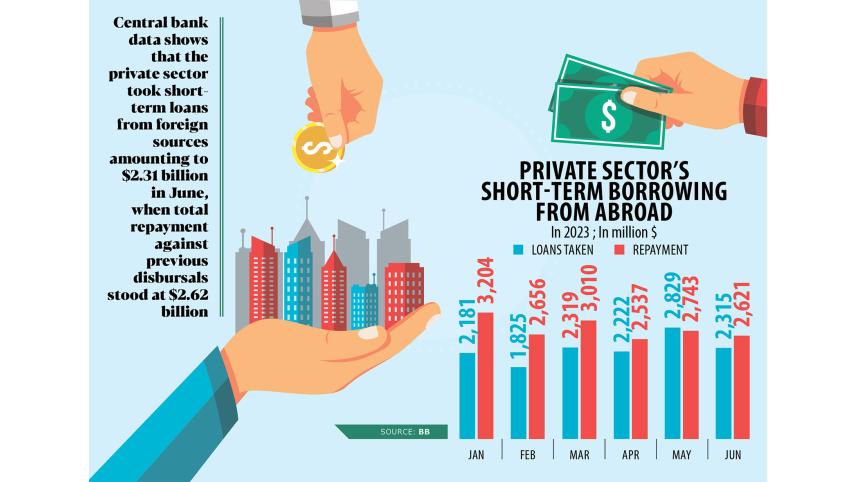Private sector’s foreign borrowing falls in June

Short-term foreign debt in the private sector fell to $13.66 billion in June, down 3 percent from $14.08 billion in May, as repayments outpaced new loans during the period, according to Bangladesh Bank.
Central bank data shows that the private sector took short-term loans from foreign sources amounting to $2.31 billion in June, when the total repayment against previous disbursals stood at $2.62 billion.
However, the trend of higher repayments compared to fresh borrowing has persisted since January.
The private sector borrowed $13.69 billion as short-term financing from foreign sources during the first six months of 2023, when repayments, including interest, totalled $16.7 billion.
The private sector borrowed $13.69 billion as short-term financing from foreign sources during the first six months of 2023
However, the picture was different in previous years.
In 2021, the private sector availed $33.96 billion as short-term financing from foreign lenders against total repayments of $29.15 billion for that year.
Similarly, repayments stood at $36.73 billion against the $37.26 billion borrowed in 2022.
Central bank officials say the higher repayments compared to fresh borrowing is harming the country's foreign reserve considering their efforts to reduce forex spending amid an ongoing shortage.
Statistics show that the country's total foreign reserve stood at $29.68 billion as of July 26, down from $31.20 billion on June 30 while it was $41.82 billion in June last year.
On the other hand, as per the standard of the International Monetary Fund, Bangladesh's foreign reserve stood at $23.30 billion as of July 26 this year.
The country's foreign reserve has been gradually declining over the past year, turning into a serious headache for Bangladesh Bank.
As per central bank statistics, Bangladesh's imports fell 14.15 percent in the July-May period of fiscal 2022-23.
However, the country's total exports increased by 6.67 percent at the same time while its inward remittance rose 2.8 percent.
Short-term loans, which mature within three to nine months, account for 63.5 percent of the total private sector borrowing from foreign sources.
But thanks to the strained US dollar stockpile, sharp devaluation of the local currency and higher interest rates, short-term loans are being discouraged by the private sector, industry insiders said.
"Those [short-term debts] are constantly rolled over -- new credit comes in and helps pay off the old amount," said Ahsan H Mansur, executive director of the Policy Research Institute of Bangladesh.
"Now, repayments for the private sector's foreign loans will have to come from the reserves," he added.
An official of a private bank said the interest rate against foreign loans is now higher than what it was previously. As a result, many private companies are not interested in availing foreign loans.




 For all latest news, follow The Daily Star's Google News channel.
For all latest news, follow The Daily Star's Google News channel.
Comments